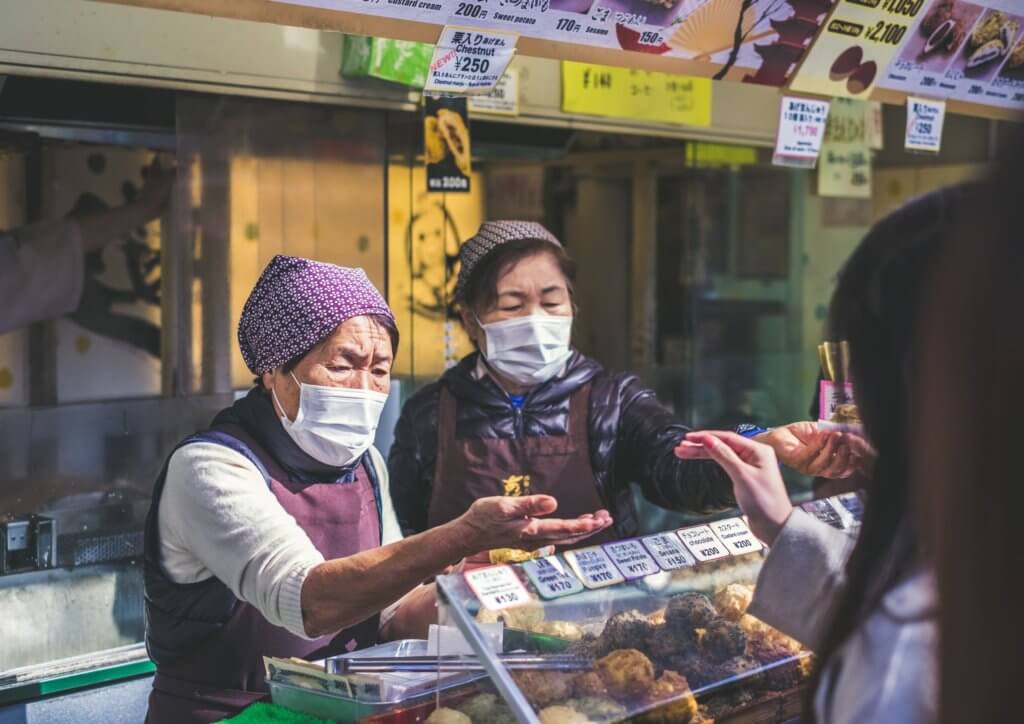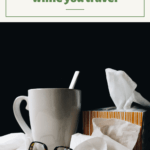*This post contains affiliate links, if you click a link I make a small commission and you help support the blog
With a changing climate, political unrest and new viruses popping up around the world, how we travel has had to change. But how do we stay healthy and protect ourselves from some of these issues while still getting to see the magic of the world?
Stay healthy against the usual suspects
We all know about the usual health concerns while travelling. There’s the closeness on planes and trains that could lead to colds and flus or eating contaminated food and water leading to traveler’s diarrhea. And who could forget things like malaria, dengue, and Zika.
These things should not scare you away from traveling to places where they are endemic (always there). Taking some simple precautions and planning before you go can make a world of difference.
A cold or an emerging strain of the flu like we saw with H1N1 is hard to prevent. Basic hand washing and not touching your face can be a big helper, we all know that.

Diseases like malaria, Dengue and Zika are all mosquito borne diseases and therefore simple precautions could save you from potentially severe illness. Long sleeves and pants, insect repellent and avoiding being outside at dusk can have a huge effect on your exposure to mosquito borne illness.
Malaria is kind of its own beast. If you know you are travelling to an area with malaria, make sure to discuss it with your physician or the travel clinic. The preventative medication is extremely hard on your body but it can save your life.
In 2017, the CDC reported 219 million cases of malaria and of those 435,000 people died. If left untreated there can be severe complications and death. Makes taking the pills seem worth it doesn’t it?
New outbreaks
Emerging infectious diseases are popping up all the time. Some are worse than others. But how can you still get out and enjoy the world while being mindful of these diseases?
Knowing what sorts of things are an ongoing issue in the countries you want to visit is one way to protect yourself. But for emerging diseases continuing to monitor updates on a country you plan to visit is a simple measure that could have a huge impact.
I have only included two particular diseases, of which are currently having a big impact. There are more out there, from tuberculosis to measles. Diseases that are common in other countries but may not be seen at home.
Novel Coronavirus
In the recent outbreak of the novel coronavirus there have been over 51,000 confirmed positives globally and over 1,600 deaths, at the time of writing this. These numbers continue to rise. Quarantines are in place and the World Health Organization (WHO) and CDC have boots on the ground to help combat this deadly virus.
The recommendations put out by the WHO are a lot of the simple things. Don’t touch your face, washing your hands, wearing a mask, and basically not invading peoples’ personal space.

A lot of travel bans and advisories have come up due to this outbreak, in an effort to contain it and hopefully stamp it out. These are put in place for a reason.
It only takes one person to become infected, not show signs of the disease immediately, but are shedding virus in large amounts, to travel to a new country and spread the disease.
You’ve all seen the movies, right? Contagion? It’s pretty accurate.
With a lot of diseases, you start shedding the virus (because it’s usually a virus) before you start showing symptoms. That tends to be when you are the most contagious.
That is why it’s so easy for viruses to travel to new places. When you are most infectious you tend not to realize it. Viruses are very good at perpetuating themselves in this way.
Ebola
Though it hasn’t been on the news as much as it should be, the Democratic Republic of Congo has been having an ongoing outbreak for a while now. Nowhere near the outbreak in West Africa from 2015-2017 but still notable.
The average case fatality rate is around 50%. It is a rare hemorrhagic disease, seen mostly in Africa.
In more recent years there has been a vaccine developed but it is mostly being used by health care workers and given to those at greatest risk.
Preventative Measures
So, with all these risks, how can you protect yourself? How do you know if you are at risk? Which countries have what?
Important websites to help you stay healthy
The two most accurate and up-to-date places to find travel advisories and recommendations for vaccines and preventative medications are the Centers for Disease Control and Prevention (CDC) and the World Health Organization (WHO).
If you are looking for the latest health threats, or information on a particular outbreak, they will have it.
They also have recommendations on basic preventative measures for every potential disease that could impact the human population.
Visit a travel clinic before you go
They cost money just to have a consultation. And maybe you could find all this information out yourself, but the people at the travel clinic know where to look.
It takes some of the pressure off you because they get your travel itinerary in advance and when you show up, they have all the information ready for you.
This includes the vaccines you may need and where you can go to get them and the preventatives for things like malaria or Zika.
A word of caution though, for both the travel clinic and the CDC. They will include all the possible scenarios; it doesn’t necessarily mean you need to do them all. These are things you should discuss.
For instance, some countries are endemic for rabies and it will be recommended that you get a rabies vaccine prior to going.
For starters, the rabies vaccine is very expensive. Depending on the things you plan on doing while in that country will determine if you actually need that vaccine or not. More often than not you won’t.
If you want to be covered 100% against everything that could happen, by all means. But I would recommend that you use common sense.
If you are travelling to a country with yellow fever, get the vaccine. It’s likely required. Some countries will not allow you in if you don’t have proof of the vaccine and have been to a country that is endemic for it.
Choosing where to visit
Monitoring the aforementioned websites can give you a lot of information on what is actively happening in those countries.
If you had plans to visit China in 2020, and were all ready to book, you should consider an alternative. Maybe China has been on your travel bucket list for years and you thought this is the year. Instead, look at what was second on your list and you go there this year. China will still be there next year.
Avoid the obvious. A lot of emerging infectious diseases are zoonotic. What does that mean? It means they can be passed from an animal to a human. Coronavirus is an example of this, though the exact species has yet to be nailed down at the time of writing this.
Avoid places like open animal markets. In some countries, many animals are taken from the wild or grown on farms and then co-mingled in these major animal markets. It is the perfect breeding ground for diseases.

H1N1 was an avian disease that got into pigs, changed and resorted to become the highly virulent H1N1 that we know today. Some viruses are really good a mixing and becoming something new in certain species.
That’s why it is recommended that pigs and birds not be housed together. Those two species are really good at mixing virus strains to create something new and extremely deadly.
And let’s face it, those markets are not sanitary.
Natural ways to boost your immune system
Prior to heading out on your next big trip, there are a couple little things you can do to boost your immune system.
It might seem obvious but living a healthier lifestyle will make you stronger and better able to fight things off. Get regular sleep, exercise and eat natural, unprocessed foods that you made yourself.
If you read this and are thinking to yourself, “Yup, I do all those things, what else could I do?” Well, you could start regularly taking products like Airborne, vitamins, elderberry, or Echinacea. All of these products naturally boost your immune system.
I have successfully fought of an oncoming cold using Airborne and Echinacea alone. So, I am a believer. I am pretty sure it isn’t just all in my head, you know placebo effect.
Purchase travel insurance
People sometimes ask, how important is travel insurance really?
Depending on the plan you choose, it doesn’t just cover lost luggage or stolen passports. It can cover you if you get sick or injured while outside your home country. Depending on the health regulations in a particular country, that could save you a lot of money.
Sure, it’s not fun dealing with an insurance company, but it can save you a lot of headache while in another country.
There are lots of companies out there that offer a variety of packages. My favorite is World Nomads but if you are looking for a breakdown of the best travel insurance companies, check out Consumer’s Advocates review.
Pack accordingly
It doesn’t take a lot of extra space to have a mini medical kit on hand.
Fill it with some of the basics, such as:
- Band-Aids
- Imodium
- electrolyte packets
- triple antibiotic ointment
- tums
- pain killers like Aspirin
- activated charcoal
- Airborne
- Echinacea tables
These items alone will help cover a lot of ailments.
And I would be remiss if I didn’t include Lifestraw here. I love their products and you can get a water bottle with filter for around $40. It filters out viruses, bacteria, parasites, microplastics, and the general grit and grim of unclean water.
And the bonus is for every item you purchase you help provide clean water, with their unique filtration system to a school for a year.
Concluding thoughts
You shouldn’t have to stall your plans because you fear the worst. You just need to be smart about it and prepared.
A disease outbreak in an area may put a hold on your plans to travel there, but it shouldn’t stop you from checking off other places on your bucket list in the meantime.
Keep yourself informed, make your travel plans based on updates from reliable websites and discuss preventative measures with your physician.
How do you stay healthy on the road?





